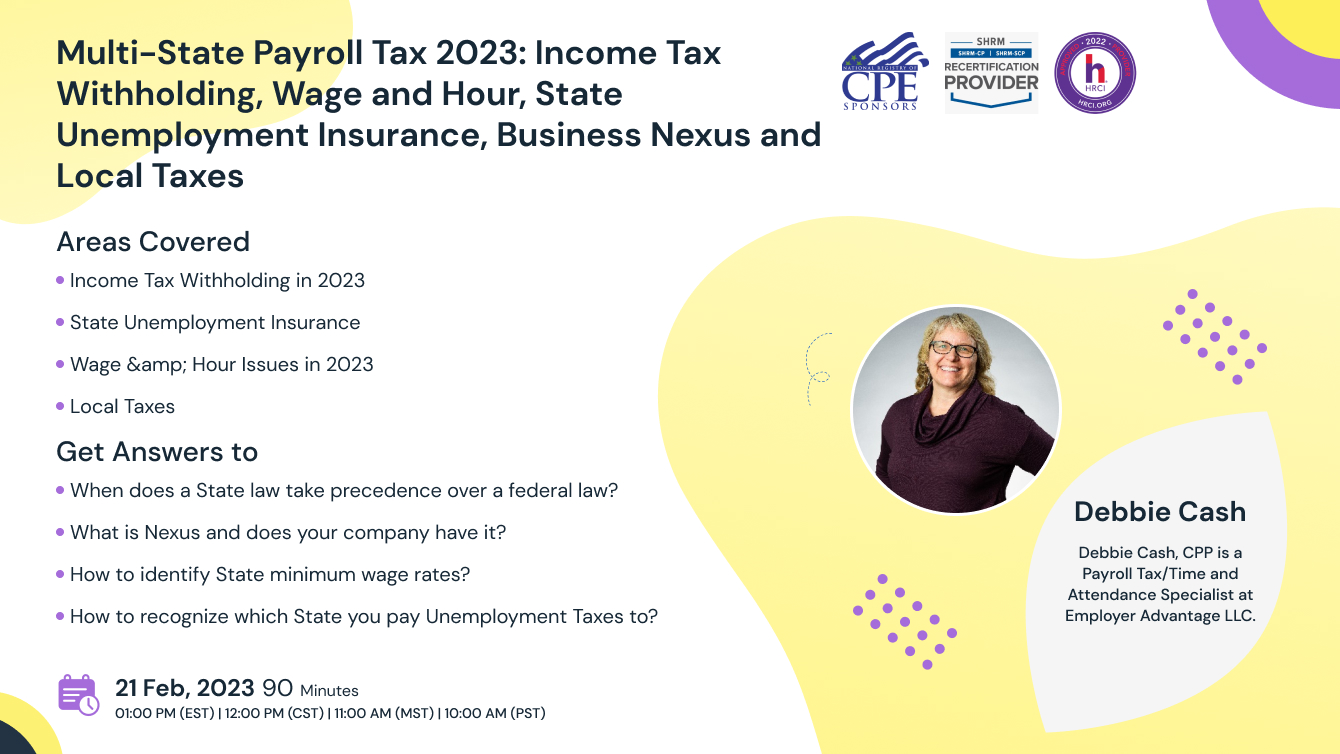Multi-State Payroll Taxation in 2023
Many companies who do business in more than one State do not understand how to determine which State they must pay taxes to. They also do not understand that each State has different laws regarding residents and non-residents. This is very difficult to keep up with and to know what taxes to withhold.
Besides State withholding, there are also local taxes in certain areas. Some States have local taxes for larger cities and other have them for every locality. You are responsible for making sure you are properly withholding for these localities and you have to know where and when to pay these taxes.
Employees must be paid at least the federal Minimum Wage. However, there are also State minimum wages and sometimes those amounts are higher than the Federal Minimum wage. Whichever wage is higher is what the employee must be paid.
Join us this February to learn what factors determine which tax the employer must withhold. We will explain the differences between residents and non-residents and how to properly report withholding for both these types of employees. You will find out whether your business has Business Nexus and what that means to you. No employer wants to face huge fines and penalties for failing to follow State laws and regulations.
This session will help you know if you are in compliance and what to do if you are not. You will be given helpful websites to find out detailed information on withholding for these taxes and where to pay them to. You will be provided with the tools necessary to make sure your business remains in compliance with all of these things.
When employees work in Multiple States, you must determine where their State Unemployment must be paid to. There are guidelines to follow to determine where these taxes are paid. This will be outlined in detail and examples will be given of different scenarios and how to handle them.
Areas Covered
-Income Tax Withholding in 2023
-State Unemployment Insurance
-Wage & Hour Issues in 2023
-Local Taxes
Get Answers to
-When does a State law take precedence over a federal law?
-What is Nexus and does your company have it?
-How to identify State minimum wage rates?
-How to recognize which State you pay Unemployment Taxes to?
-What are the 4 points to determine what State to pay UI to?
What You will Learn
Many Employers do not realize they have to pay taxes for the State the employee is working in. There are guidelines to follow in each State and determinations to be made on which State governs for employees working across multiple States.
We will go over the 4 factors on how to determine which State the Unemployment should be paid to and how to look at these factors. It is important to do this correctly or fines/penalties can be assessed.
All factors must be considered when dealing with Tax laws and specifically across State lines. Keeping up with these is difficult which is why it is important to know where to research the laws and regulations and continuing education to keep up with them is key.
Why You Should Attend
If your business has employees who work in different States, then this session will help ensure you are paying the proper taxes for Unemployment and Withholding.
Are you only withholding and paying payroll taxes for the State you are located in? Many companies don’t even realize that they should be paying taxes to other States or localites. Even if you don’t have a physical presence or location in another State doesn’t mean you aren’t subject to withholding for that State. This is called Business Nexus and you will want to know if your business has it. This session will define what Business Nexus is and what is required if you have it.
Multi-State taxes can be very complex and hard to understand. Making sure you are in compliance is difficult. If you are unsure if you are withholding everything you need to withhold, then you would want to attend this session. We will cover the fundamentals of the different types of withholdings and unemployment you will need to be aware of. We will also discuss how to determine which State to withhold taxes for and other things to consider.
When employees work in more than one State, you may be unsure which State to pay Unemployment to. The rules to determine this can be confusing and you may not be aware of how to even make this determination. If an employee terminates and files for unemployment in their home state you run the risk of receiving penalties if you have not filed wages to the correct State for unemployment benefits. Attending this session will give you guidance on how to make the correct determination.
Who will Benefit
-Payroll Professionals
-Owners
-Accountants
-CFO
-Tax Professionals
-Bookkeepers
-Businesses operating in more than 1 State
-Businesses having employees who work in a different State than where the business location is or employees working in multiple States
-Businesses selling products over State lines

Debbie Cash
Debbie Cash, CPP is a Business Analyst-Implementation at G&A Partners. She collaborates with Clatid Compliance to provide trainings on payroll and human resources. She was formerly a Payroll Tax/Time and Attendance Specialist at Employer Advantage LLC. G&A Partners is a Professional Employer Organization (PEO) that offers payroll, human resources, benefits management, risk management, and accounting services for businesses and they recently acquired Employer Advantage LLC a former PEO. She has been with the organization since 2006.
Debbie earned an associate's degree in Accounting from MSSU in 1985 and a bachelor's degree in General Business from MSSU in 2006. She obtained her Certified Payroll Professional Certification in October 2006. She has 30+ years of experience processing payroll and payroll taxes for various different companies and professions.
Debbie worked as a Payroll Specialist at Missouri Southern State University from 1993 to March 2006. She attended the International Tax Conference in Wisconsin in 2005 and specialized in International Tax for Student Visa’s. She also worked for Joplin R-8 School District from 1990 to 1993.
Standeagle Webinar Certification - Standeagle rewards you with Standeagle Achievement Certification for unlocking and attending this webinar. It is to acknowledge your participation in this training session and to add more to your professional score.
Standeagle Courses and Webinars or any Education published "Articles & Materials" strictly follows the standards and guidelines of the Professional Credit / CEU Providers and Well Researched before publishment.
Standeagle is registered with the National Association of State Boards of Accountancy (NASBA) as a sponsor of continuing professional education on the National Registry of CPE Sponsors. State boards of accountancy have final authority on the acceptance of individual courses for CPE credit. Complaints regarding registered sponsors may be submitted to the National Registry of CPE Sponsors through its web site: www.nasbaregistry.org.
Standeagle doesn't support any Fake - News, Articles, or Compliance updates; Our Industry Experts are highly verified and recognized, and their Pre-publishment is verified via our experts and fact-checkers.

ACCREDITATIONS


